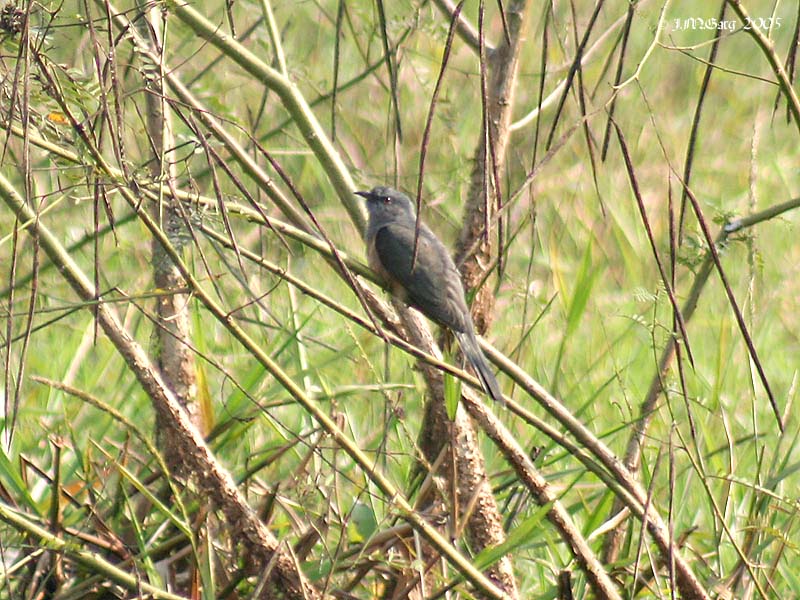|
| 질의: Brown prinia | 결과: 6번째/8 | |
Plaintive Cuckoo (Cacomantis merulinus) - Wiki
| 제목: | Plaintive Cuckoo (Cacomantis merulinus) - Wiki
| |

| 해상도: 800x600
파일크기: 145196 Bytes
촬영일: 2005:12:11 09:39:37
사진기: Canon EOS 350D DIGITAL (Canon)
F number: f/5.6
Exposure: 1/250 sec
Focal Length: 300/1
등록시간: 2008:01:02 14:23:13
|
Plaintive Cuckoo
From Wikipedia, the free encyclopedia
Order: Cuculiformes
Family: Cuculidae
[Photo] Plaintive Cuckoo (Cacomantis merulinus) in Kolkata, West Bengal, India. Date 11.12.05. Author J.M.Garg (http://commons.wikimedia.org/wiki/User:J.M.Garg). Copyright (C) 2005 J. M. Garg
Permission is granted to copy, distribute and/or modify this document under the terms of the GNU Free Documentation License, Version 1.2 or any later version published by the Free Software Foundation; with no Invariant Sections, no Front-Cover Texts, and no Back-Cover Texts. A copy of the license is included in the section entitled "GNU Free Documentation License". |
The Plaintive Cuckoo (Cacomantis merulinus) is a species of bird belonging to the genus Cacomantis in the cuckoo family Cuculidae. It is native to Asia, from India and China to Indonesia.
Description
It is a fairly small cuckoo, 21-23.5 centimetres long. The adult male is grey-brown above and orange below with a grey head, throat and upper breast. There are white tips to the tail feathers. The legs and feet are yellow, the eye is red and the bill is black above and yellow below. The adult female is sometimes similar to the male but often occurs in a "hepatic" morph. This form is reddish-brown above with dark bars. The underparts are paler with fainter barring. There is a pale stripe over the eye and the tail has dark bars along its whole length. Juvenile birds are similar to hepatic females but are paler and have dark streaks rather than bars on the crown and throat.
The male has several plaintive whistling calls. These include an ascending series of three-note phrases and a series of 11 or 12 descending notes.
Distribution and subspecies
There are four subspecies. The nominate form Cacomantis merulinus merulinus is found in the Philippines where it is common on many of the larger islands. Cacomantis merulinus querulus is the most widespread form, occurring in north-east India, Bangladesh, southern China, Myanmar, Thailand, Cambodia, Laos and Vietnam. It is a summer visitor to most of its Chinese range, migrating south for the winter. Cacomantis merulinus threnodes is found in the Malay Peninsula, Sumatra and Borneo while Cacomantis merulinus lanceolatus occurs in Java, Bali and Sulawesi.
The Grey-bellied Cuckoo (Cacomantis passerinus) was formerly classified as a subspecies of the Plaintive Cuckoo but is now often treated as a separate species.
Ecology
The Plaintive Cuckoo inhabits forest edge, open woodland, scrub, grassland, farmland, parks and gardens. It feeds on invertebrates. It is normally solitary and is often difficult to see.
It is a brood parasite, laying its eggs in the nests of cisticolas, prinias and tailorbirds. The eggs are similar to those of the host species but are larger. Small birds often mob the cuckoo to drive it away from their nests.
http://en.wikipedia.org/wiki/Plaintive_Cuckoo
| The text in this page is based on the copyrighted Wikipedia article shown in above URL. It is used under the GNU Free Documentation License. You may redistribute it, verbatim or modified, providing that you comply with the terms of the GFDL. |
|
^o^
동물그림창고 똑똑전화 누리집
^o^
|
|

